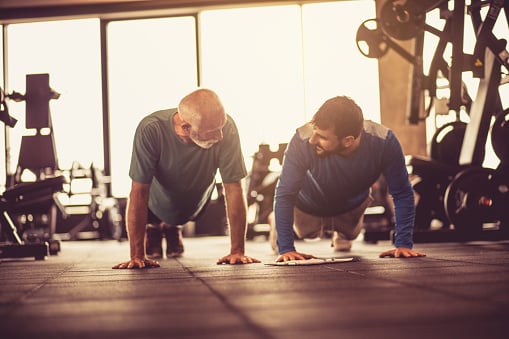According to new research, older adults can actually make their hearts younger through the power of exercise.
That’s pretty incredible, isn’t it?
More specifically, as people age, the heart naturally becomes less flexible and less efficient in processing oxygen, even in healthy adults. These signs of aging typically show up when people are in their 50s or 60s —and, for people who don’t exercise, these changes can happen even earlier. To provide a visual image of this change in heart muscles, an expert quoted on NPR.org compares a younger heart to a pliable rubber band. Twenty years later, that same rubber band may have become dry and brittle, and this evolution can serve as a metaphor for changes that occur in the human heart.
Here’s more about the good news recently published in the American Heart Association’s journal, Circulation: even if you didn’t exercise much as a young adult, getting in shape midlife may help restore your heart muscles. In fact, people who participated in a two-year study and were assigned to the higher-intensity exercise group saw “dramatic improvements in heart health,” taking 50-year-old hearts and turning “the clock back to 30- or 35-year-old hearts.”
A key element of the exercise program used in this study is interval training where short bursts of intense exercise are followed up by a few minutes of rest. Note: the head of the study says that people should check with their doctors before starting this exercise program. A doctor might suggest an initial program that’s less intense, he says.
Another NPR.org article shares study results indicating that people in their 70s who regularly exercise “seem to have put a brake on the aging process, maintaining the heart, lung and muscle fitness of healthy people at least 30 years younger.”
This study, performed by the Human Performance Laboratory of Ball State University, looked at a population of lifelong exercisers—people who participated in the aerobics and running trends of the 1970s and just kept on moving. What kind of health, Scott Trappe, an exercise physiologist wondered, would people have after 50 years of regular exercise?
What he found was 75-year-old people with the cardiovascular health of a 40- to 45-year-old, suggestive of dramatic benefits of exercise programs. Muscle health findings were even more significant, with muscles of people in their mid-70s being equal to that of younger adults in their mid-20s.
Recommendations from the physiologist who oversaw the study include:
- You should participate in 30 to 60 minutes of daily exercise
- You don’t need to run marathons; walking daily will provide “significant and substantial” health benefits
A spokesperson for the American Heart Association suggests swimming, yoga and cycling are also beneficial.
Finally, a quote from the New York Times offers up this philosophy. Exercise, the article reads, is a “commitment . . . part of personal hygiene, like brushing . . . teeth. It should be something we do as a matter of course to keep ourselves healthy.”
Kendal At Home Resources About Exercise Programs
In our Kendal at Home blog, we often provide information about exercise programs for older adults, and here are just five of our posts to use as resources:










